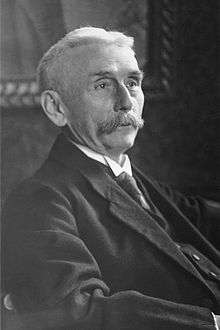Otto Schott
Friedrich Otto Schott (17 December 1851 – 27 August 1935) was a German chemist, glass technologist, and the inventor of borosilicate glass. He was the son of a window glass maker, Simon Schott. From 1870 to 1873 Schott studied chemical technology at the technical college in Aachen and at the universities of Würzburg and Leipzig. He attained a doctorate in glass chemistry at Friedrich Schiller University of Jena for his thesis “Contributions to the Theory and Practice of Glass Fabrication”.[1]
Otto Schott | |
|---|---|
 | |
| Born | 17 December 1851 |
| Died | 27 August 1935 (aged 83) |
| Nationality | German |
| Alma mater | Friedrich Schiller University of Jena |
| Known for | borosilicate glass. |
| Awards | Liebig Medal (1909) |
| Scientific career | |
| Institutions | University of Jena |
In 1879, Schott developed a new lithium-based glass that possessed novel optical properties. Schott shared this discovery with Dr Ernst Abbe, which was the catalyst for a long professional relationship between the two.
In 1884, in association with Dr Ernst Abbe and Carl Zeiss, Otto founded Glastechnische Laboratorium Schott & Genossen (Schott & Associates Glass Technology Laboratory) in Jena. It was here, during the period 1887 through to 1893, that Schott developed borosilicate glass. Borosilicate glass is distinguished for its high tolerance to heat and a substantial resistance to thermal shock (sudden temperature changes) and resistance to degradation when exposed to chemicals.
In 1926, Otto Schott retired from active work at Schott & Gen.